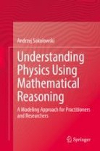- About MAA
- Membership
- MAA Publications
- Periodicals
- Blogs
- MAA Book Series
- MAA Press (an imprint of the AMS)
- MAA Notes
- MAA Reviews
- Mathematical Communication
- Information for Libraries
- Author Resources
- Advertise with MAA
- Meetings
- Competitions
- Programs
- Communities
- MAA Sections
- SIGMAA
- MAA Connect
- Students
- MAA Awards
- Awards Booklets
- Writing Awards
- Teaching Awards
- Service Awards
- Research Awards
- Lecture Awards
- Putnam Competition Individual and Team Winners
- D. E. Shaw Group AMC 8 Awards & Certificates
- Maryam Mirzakhani AMC 10 A Awards & Certificates
- Two Sigma AMC 10 B Awards & Certificates
- Jane Street AMC 12 A Awards & Certificates
- Akamai AMC 12 B Awards & Certificates
- High School Teachers
- News
You are here
Understanding Physics Using Mathematical Reasoning

Publisher:
Springer
Publication Date:
2021
Number of Pages:
219
Format:
Hardcover
Price:
159.99
ISBN:
978-3-030-80204-2
Category:
Monograph
[Reviewed by , on ]
Gianluca Caterina
06/20/2022
The book Understanding Physics Using Mathematical Reasoning, by Andrzej Sokolowski, aims to bring clarity to the relation between some of the broad themes in mathematical reasoning and the way how basic principles of physics are typically taught. The structure of the text unfolds in three parts. In part one and two some general conceptual background is provided, along with a discussion on how to design learning environments that can help students to focus on the mathematical structures behind basic notions in physics, whereas in part three eight case studies are presented, with the goals to measure students’ outcomes based on their responses to various questionnaires and problems.
The overall impression is that the author’s main thesis – that it is beneficial for the students to learn physics while also focusing on the underlying logical principles behind it – is interesting and original. On the other hand, it appears to be in the text some lack of the structural coherence needed to hold the work together as a whole; the exposition of the main ideas is fragmented and does not unfold in a smooth or especially engaging exposition. The conceptual background provided in the first two parts is at the same too broad and not developed with enough depth to provide a solid motivation for the analysis of the case studies presented in the third part, which is meant to be the core section of the book.
While Understanding Physics Using Mathematical Reasoning might be of some interest to scholars whose research focuses on the pedagogical aspects of teaching physics, its usefulness in the actual classroom setting is less clear.
Gianluca Caterina is Professor of Mathematics at Endicott College in Beverly, MA. His current research focuses on logic, philosophy of science and applied category theory.
See the publisher's website.
- Log in to post comments




